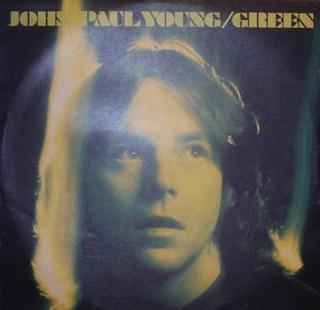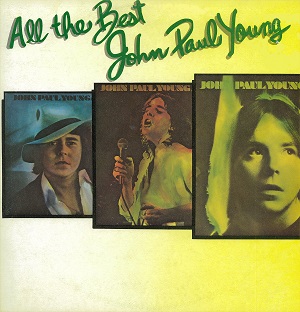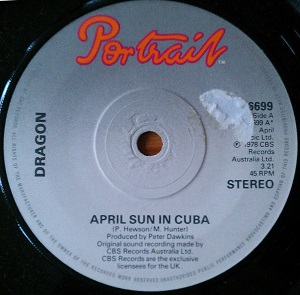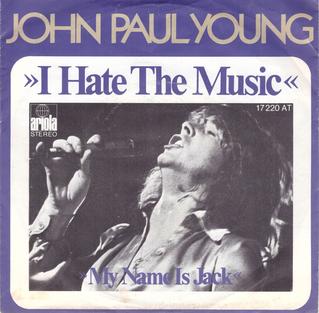Ol' 55 are an Australian band specialising in retro, 1950s-era Rock 'n' Roll. They formed as Fanis in 1972 in Sutherland, Sydney. Drummer Geoff Plummer was working with Glenn A. Baker at the NSW Department of Media and invited Baker to hear his part-time band, including Patrick "Meatballs" Drummond, Rockpile Jones and Jimmy Manzie. In 1975, Baker took on their management, renamed them as Ol' 55 for the Tom Waits song, and recruited front man Frankie J. Holden and, later in the year, saxophonist Wilbur Wilde.
Company Caine, also styled as Co. Caine and Company Kane, were an Australian progressive rock band. They were formed in March 1970 by Ray Arnott on drums, Cliff Edwards on bass guitar (ex-Cam-Pact), Jeremy Noone on saxophone and keyboards, Gulliver Smith on lead vocals and Russell Smith on guitar and vocals (ex-Cam-Pact).
Hush were an Australian glam rock pop band, which formed in 1971 and disbanded in 1977.
Machinations are an Australian synthpop band which formed in 1980. They reached the top 20 on the Kent Music Report albums chart with Big Music in 1985. Their top 30 hits on the related singles chart are "Pressure Sway", "No Say in It", "My Heart's On Fire" and "Do to You". By 1989 the group had disbanded. They briefly reunited in 1997 and then reformed in 2012.

Darryl Grant Cotton was an Australian pop, rock singer-songwriter, television presenter and actor. He was a founding member of Australian rock group Zoot in 1965, with Beeb Birtles, and were later joined by Rick Brewer and Rick Springfield. As a solo artist Cotton released the albums, Best Seat in the House (1980), It's Rock 'n' Good Fun (1984) and Let the Children Sing (1994). In April 1980 his biggest solo hit, "Same Old Girl", which was co-written by Cotton, peaked at No. 6 on the Australian Kent Music Report Singles Chart. He acted in the TV soap opera, The Young Doctors (1979), and on stage as Joseph in the theatre production of Joseph and the Amazing Technicolour Dreamcoat (1983).

"I'm Just a Singer (In a Rock and Roll Band)" is a 1973 hit single by the English progressive rock band the Moody Blues, written by the band's bassist, John Lodge. It was first released in 1972 as the final track on the album Seventh Sojourn and was later released as a single in 1973, with "For My Lady" as its B-side. It was the second single released from Seventh Sojourn, with the first being "Isn't Life Strange", which was also written by Lodge.

Air Supply is the debut album by British/Australian soft rock band Air Supply released on CBS Records in December 1976. The lead single "Love and Other Bruises" was released in October, reaching No. 6 on the Kent Music Report Singles Chart, followed by the album's peak at No. 17 on the Kent Albums Chart. While the album reached gold status in Australia, the second single "Empty Pages" did not reach the Top 40 in February 1977. The album was issued as Strangers in Love in Japan.
"I Wanna Do It With You" is a pop song written by George Young and Harry Vanda and recorded by Australian pop singer John Paul Young. The song was released in February 1977 as the lead single from Young's third studio album, Green (1977). The song peaked at number 7 on the Kent Music Report, becoming Young's 4th Australian top ten single.
Russell James Dunlop was an Australian musician, singer-songwriter and record producer-engineer. From the late 1970s he collaborated with Bruce Brown in a production company for albums and singles by Australian performers including Mental As Anything, The Reels and Machinations. As a musician he was a member of various groups such as Aesop's Fables (1968–70), Levi Smith's Clefs (1971), Southern Contemporary Rock Assembly (SCRA) (1971–72) and Ayers Rock (1976).

Creatures of Leisure is the fourth studio album released by Australian band, Mental As Anything. It was released in March 1983 and peaked at #8 on the Australian Album charts.

Green is the third studio album by Australian pop singer John Paul Young, released in April 1977. It peaked at number 19 on the Australian albums chart. The album was certified gold in Australia by the end of 1977.

All the Best is the first compilation album by Australian pop singer John Paul Young. Released in November 1977, the album charted at number 40 on the Kent Music Report. The album includes songs from his three studio albums Hero, J.P.Y. and Green.
Southern Contemporary Rock Assembly or SCRA was an Australian jazz-rock group formed in mid-1971 by Sheryl Black on lead vocals, Ian Bloxsom on percussion, Russell Dunlop on drums, Dave Ellis on bass guitar, Greg Foster on trombone and harmonica, Mickey Leyton on lead vocals, Jim Kelly on lead guitar, Mike Kenny on trumpet, Peter Martin on guitar and vocals and Don Wright on tenor sax and flute.
The Bootleg Family Band were an Australian folk, R&B and rock band formed in 1973 by Brian Cadd on lead vocals with Geoff Cox on drums, Tony Naylor on lead guitar, Penny Dyer on backing vocals, Gus Fenwick on bass guitar, Brian Fitzgerald on keyboards, Angela Jones on lead and backing vocals, Louise Lincoln on backing vocals and Russell Smith on trumpet. The group became the in-house band for Cadd's label, Bootleg Records. They also released their own material and had chart success with cover versions of "Your Mama Don't Dance" and "The Shoop Shoop Song ", which both reached the top 10 on Australian singles charts. The group toured the United States and performed on the TV shows, The Midnight Special and Don Kirshner's Rock Concert in 1974. Early in the following year they trimmed back to a five-piece line-up as The Bootleg Band. Late that year, Cadd left to work in the US and the remaining members renamed themselves as Avalanche. That group issued a self-titled album in September 1976 and had a further name change to Front Page disbanded in 1978. Cadd reassembled the Bootleg Family Band in 2015 to release a studio album, Bulletproof, which was supported by a short tour.

"April Sun in Cuba" is a song recorded by New Zealand group Dragon, released in October 1977. It is the first single to be released from Dragon's fourth studio album Running Free. "April Sun in Cuba" first charted on 7 November 1977, peaking at number 2 on the Kent Music Report Singles Chart and staying on the chart for 22 weeks. It also reached number 9 on the New Zealand singles chart. The b-side of the single, a non-album track called "Telephone", was credited to "Dr. Agony".

Hero is the debut studio album by Australian pop singer John Paul Young. The album was released in October 1975 and peaked at 9 and stayed in the charts for 20 weeks.

One Foot in Front is the seventh studio album by Australian pop singer John Paul Young, released in March 1984. The album spawned four singles, "Soldier of Fortune" in 1983, and "War Games", "L.A. Sunset" and "Call the Night" in 1984. For European release in 1984, the album was titled Soldier of Fortune, and for re-release in 1992 it was renamed War Games. It is the first Young album to not feature Vanda & Young as producers.

Heaven Sent is the fifth studio album by Australian pop singer John Paul Young, released in November 1979. The album was produced by Vanda & Young. It peaked at number 95 on the Australian Kent Music Report.

"I Hate the Music" is a pop song written by George Young and Harry Vanda and recorded by Australian pop singer John Paul Young. The song was released in March 1976 as the lead single from the singer's second studio album, J.P.Y. (1976). It peaked at number 2 on the Kent Music Report in Australia, remaining on the chart for 20 weeks. It was certified gold in Australia. It reached number 1 on the South African singles chart.

"The Love Game" is a song by Australian pop singer John Paul Young, released in September 1975 as the second single from his debut studio album, Hero (1975). The song peaked at number 4 on the Australian Kent Music Report.












